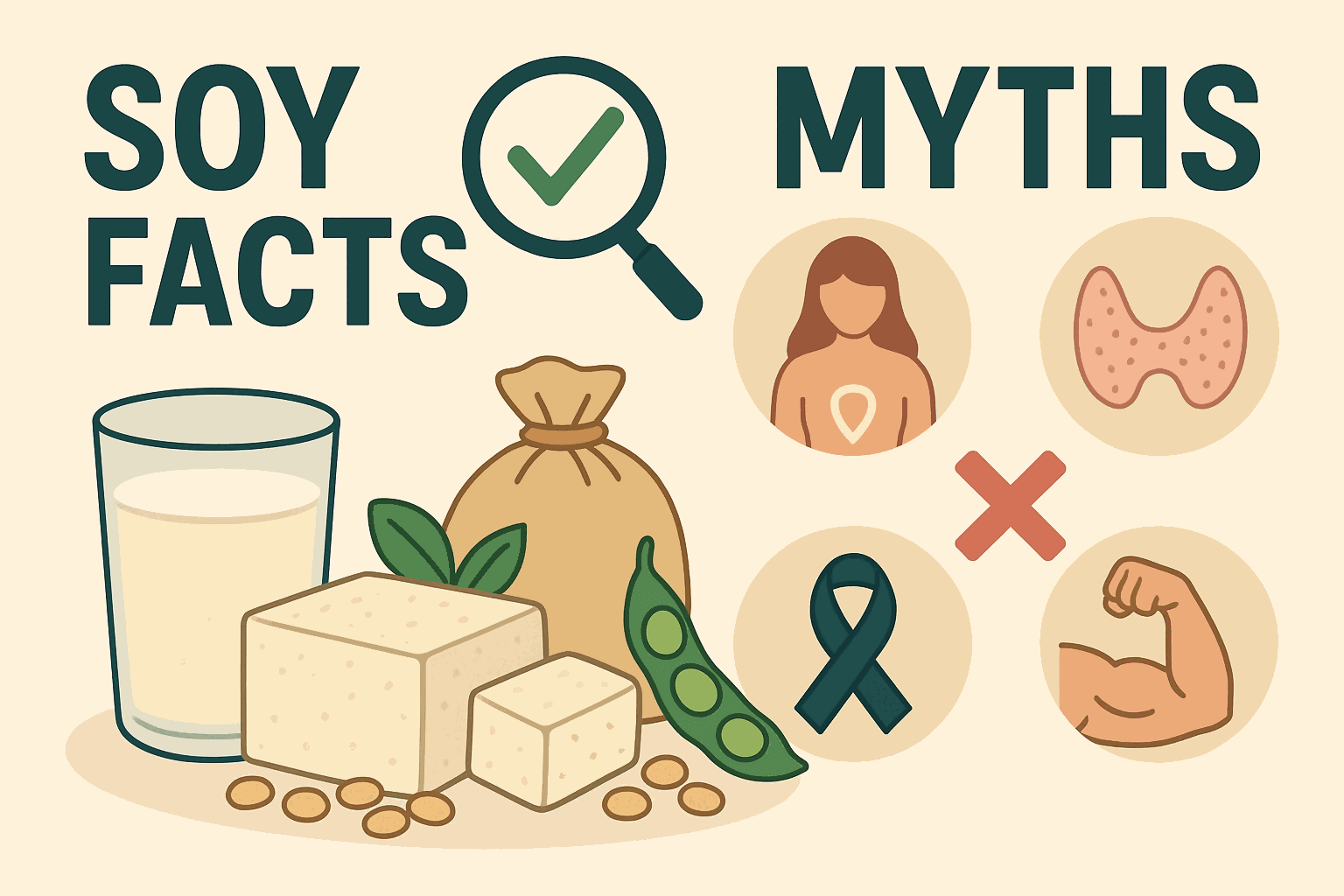
Unlocking Longevity: How Your Diet Shapes the Aging Process
- Marcus Reed
- Nutrition , Health , Aging , Preventive health
- May 13, 2025
Table of Contents
Fast Facts: Diet and Healthy Aging (TL;DR)
- Plant-Powered Longevity: Diets rich in vegetables, fruits, whole grains, nuts, and legumes are strongly linked to better health in later life and a reduced risk of age-related diseases.
- Cellular Protection: Plant-based foods contain polyphenols, fiber, healthy fats, vitamins, and minerals that combat oxidative stress, reduce inflammation, and support DNA repair.
- Aging Accelerators: Diets high in processed foods, saturated/trans fats, salt, and added sugars can speed up aging by increasing inflammation and metabolic disruption.
- Gut Health is Key: A healthy gut microbiome, nurtured by dietary fiber, plays a crucial role in immune function and reducing systemic inflammation, impacting the aging process.
- Individuality Matters: While general dietary patterns show clear trends, individual factors like genetics, allergies, and existing health conditions necessitate personalized nutrition approaches.
- Social Connection Benefit: Eating meals with others, even if the food isn’t “perfect,” might offer some protective effects against aging by reducing stress and improving mental well-being.
The Quest for a Longer, Healthier Life: Insights from Dietary Science
Aging is a complex biological process, but emerging research increasingly points to a powerful lever within our control: nutrition. How we eat can profoundly influence not just our lifespan, but more importantly, our “healthspan” – the years we live in good health, free from debilitating disease. In March 2025, a landmark cohort study, following over 100,000 individuals for more than three decades, shed further light on this connection (PubMed ID: 40128348). This extensive research analyzed the interplay between dietary patterns and the likelihood of developing age-related conditions such as cancer, cardiometabolic diseases (like heart disease and type 2 diabetes), autoimmune disorders, sarcopenia (muscle loss), osteoporosis, and cognitive decline.
Key Finding: The Anti-Aging Power of Plants
The study’s results were compelling: participants adhering to a diet predominantly featuring plant-based foods—abundant in vegetables, fruits, whole grains, nuts, legumes, and healthy fats like olive oil—demonstrated a markedly higher chance of maintaining robust health beyond the age of 70. This dietary strategy was associated with a significant reduction in systemic disease risk and a notable extension of a healthy lifespan. This underscores the potential of a “best diet for slowing down aging process” to be largely plant-centric.
The Biological Blueprint: Why Plant-Based Diets Champion Healthy Aging
The efficacy of plant-rich diets in promoting longevity isn’t coincidental; it’s rooted in their profound impact on our biology. These foods are packed with essential nutrients and bioactive compounds (phytochemicals) that favorably modulate key biological pathways implicated in the aging process. Understanding “how plant-based foods impact cellular aging” offers a clear rationale for their benefits.
- Polyphenols: Nature’s Antioxidant Army: Abundant in fruits, vegetables, tea, and dark chocolate, polyphenols are powerful antioxidants. They help neutralize harmful free radicals, thereby reducing oxidative stress—a major driver of cellular damage and aging. Beyond their antioxidant capacity, polyphenols also play a crucial role in regulating inflammatory responses and influencing signaling pathways involved in programmed cell death (apoptosis) and cellular growth (proliferation), helping to prevent uncontrolled cell growth seen in cancer. [1]
- Dietary Fiber: Fueling a Healthy Gut: Dietary fiber, found plentifully in whole plant foods, is indigestible by human enzymes but serves as critical fuel for beneficial gut bacteria. A thriving and diverse gut microbiome is essential for robust immune function, maintaining the integrity of the gut lining (epithelial barrier), and modulating systemic inflammation. The “impact of gut health on longevity” is an increasingly recognized factor in healthy aging. [2]
- Healthy Fats: Building Blocks for Vitality: Monounsaturated fats (from olive oil, avocados, nuts) and polyunsaturated fats (from fatty fish, flaxseeds, walnuts) are vital for health. They contribute to improved blood lipid profiles (lowering LDL cholesterol), enhanced insulin sensitivity, and the maintenance of cellular membrane fluidity and stability, crucial for proper cell function.
- Essential Vitamins and Minerals: Cofactors for Life: Plant foods are rich sources of numerous vitamins and minerals that act as cofactors in countless enzymatic reactions. These nutrients are indispensable for critical processes like DNA repair mechanisms (protecting our genetic blueprint), bolstering the body’s intrinsic antioxidant defense systems, and ensuring smooth metabolic regulation.
Collectively, these nutritional components synergize to decelerate the progression of chronic diseases, bolster the body’s innate capacity for repair and regeneration, and promote overall resilience against the stressors that contribute to aging.
Dietary Saboteurs: What Accelerates the Aging Clock?
Conversely, certain dietary patterns can unfortunately hasten the aging process. Diets characterized by a high intake of ultra-processed foods, saturated and trans fats, excessive salt, and added sugars are detrimental. According to public health guidance, such dietary habits contribute to: [3]
- Increased Systemic Inflammation: Chronic low-grade inflammation is a hallmark of aging and a precursor to many age-related diseases.
- Disrupted Metabolic Balance: This can manifest as insulin resistance, impaired glucose metabolism, and an increased risk of type 2 diabetes and obesity.
- Impaired Immune Function: A poor diet can weaken the immune system, making individuals more susceptible to infections and less capable of effective immune surveillance.
- Accelerated Cellular and Organ Aging: The cumulative damage from these dietary factors can speed up the decline in function at both cellular and organ levels.
Furthermore, specific food processing methods, particularly high-heat cooking like frying, and the use of certain preservatives, can lead to the formation of pro-oxidant compounds and Advanced Glycation End products (AGEs). AGEs are harmful compounds formed when proteins or fats combine with sugars in the bloodstream. They accumulate in tissues over time, contributing to arterial stiffness, skin aging, and the progression of various chronic diseases, essentially causing significant “tissue damage” and accelerating aging. [4] Identifying and minimizing “foods that accelerate aging and inflammation” is a crucial step.
The Fast Food Enigma: A Social Twist?

An intriguing, albeit nuanced, observation from the March 2025 cohort study was that moderate consumption of fast food wasn’t invariably linked to the poorest health outcomes in all individuals. One proposed explanation delves into the social context of eating. Sharing a meal with others, even if the nutritional quality of the food isn’t optimal, might confer certain benefits. These could include reduced chronic stress levels and enhanced mental well-being, potentially counteracting some of the physiological damage. Social connection is increasingly recognized as a vital component of overall health, whereas social isolation is a known independent risk factor for increased inflammation and higher mortality rates. [5] This doesn’t endorse frequent fast food consumption, but rather highlights the complex interplay of lifestyle factors.
Beyond Generalizations: The Importance of Personalized Nutrition
While large-scale studies provide valuable insights into population-level trends, it’s paramount to acknowledge individual variability in response to diet. Factors such as food intolerances (e.g., lactose intolerance, non-celiac gluten sensitivity), allergies, pre-existing autoimmune conditions (like rheumatoid arthritis or inflammatory bowel disease), and specific metabolic disorders (e.g., phenylketonuria) necessitate tailored “personalized nutrition strategies for healthy aging.”
A 2022 systematic review published in PubMed emphasized that an individual’s unique sensitivity to various food components is a critical determinant of the long-term effectiveness and safety of any dietary regimen. [6] Therefore, while a predominantly plant-based approach offers a solid foundation, the specifics may need adjustment based on personal health profiles and, ideally, guidance from healthcare professionals or registered dietitians.
Actionable Takeaways for Your Healthy Aging Protocol
A dietary pattern centered around whole, plant-based foods emerges as a potent instrument for promoting healthy aging and “reducing oxidative stress through diet for anti-aging.” Such a diet works by mitigating chronic inflammation and oxidative damage, enhancing metabolic flexibility and resilience, and safeguarding against degenerative processes that typify aging.
While restrictive diets like ketogenic or very low-carbohydrate diets may have specific therapeutic applications (e.g., in epilepsy or under strict medical supervision for certain metabolic conditions), they are generally not recommended as long-term, unsupervised lifestyle choices for the general population seeking healthy aging. The cornerstone of a sustainable, health-promoting, and age-slowing dietary protocol should be diversity, balance, and an abundance of anti-inflammatory, nutrient-dense foods, primarily from plant sources.
Consider this: have you ever paused to evaluate the proportion of plant-derived versus animal-derived foods in your daily meals? Even incremental shifts towards incorporating more plants can yield measurable, positive impacts on your biological trajectory and contribute to a healthier, more vibrant future.
Frequently Asked Questions (Q&A)
Q1: What are the main benefits of a plant-rich diet for slowing down aging?
Q2: Which specific foods are known to accelerate the aging process?
Q3: How important is gut health for healthy aging, and how does diet affect it?
Q4: Can social interaction during meals really affect how my body ages?
Q5: Is a strict vegetarian or vegan diet the only way to achieve anti-aging benefits through nutrition?
Disclaimer
The information provided on BioBrain is intended for educational purposes only and is grounded in science, common sense, and evidence-based medicine. It is not a substitute for professional medical advice, diagnosis, or treatment. Always consult a qualified healthcare provider before making significant changes to your diet, exercise routine, or overall health plan.
References
- Nutrients (2022) "Polyphenols as an Effective Factor in the Human Diet for Reducing the Risk of Developing Chronic Diseases"
- Joelma N de Souza, Cíntia de L Oliveira 1, Wéslei A C Araújo 1, Alex B S Souza (2020) "Gut Microbiome and Its Role in Aging"
- World Health Organization (WHO) (2020) "Healthy Diet - Key Facts"
- JAIME URIBARRI, SANDRA WOODRUFF, , SUSAN GOODMAN (2010) "Advanced Glycation End Products in Foods and a Practical Guide to Their Reduction in the Diet"
- Debra Umberson, Jennifer Karas Montez (2011) "Social Relationships and Health: A Flashpoint for Health Policy"
- Ivan Bautmans, Veerle Knoop (2022) "Food-Related Intolerance, Sensitivity and Autoimmunity: In Search of a Unified Concept"
- Anne-Julie Tessier, Fenglei Wang (2025) "Optimal dietary patterns for healthy aging"
- Mark Rinnerthaler, Johannes Bischof, Maria Karolin Streubel, Andrea Trost, Klaus Richter (2015) "The Role of Oxidative Stress in the Aging Process"
- Office of Disease Prevention and Health Promotion (health.gov) (n.d.) "Healthy Aging"
- Harvard T.H. Chan School of Public Health (Acce) "Anti-Inflammatory Diet"
Tags :
- Healthy aging
- Nutrition science
- Inflammation
- Dietary patterns
- Longevity diet
- Anti aging foods
- Gut health and aging
- Oxidative stress reduction


